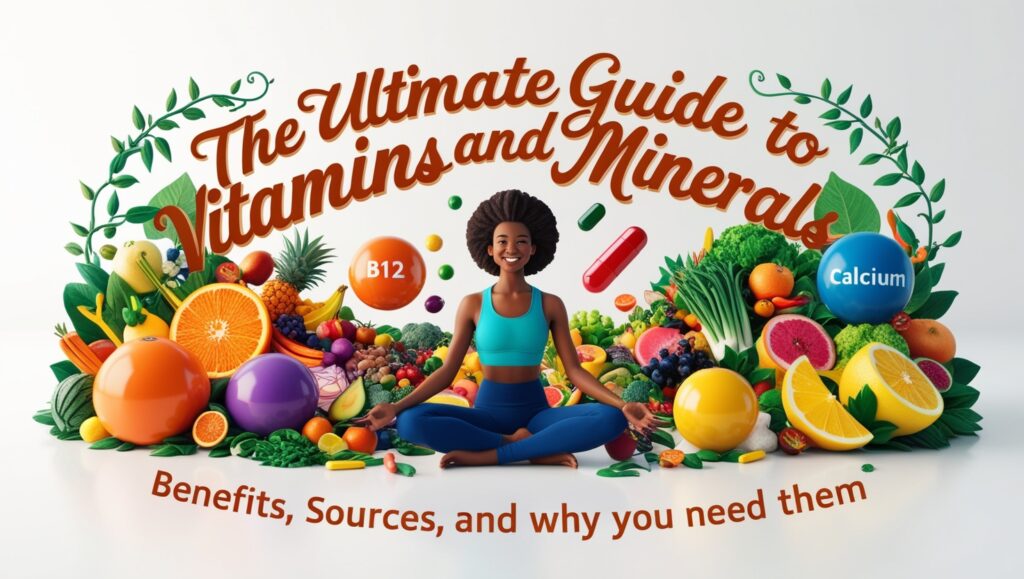In today’s fast-paced world, maintaining good health is more important than ever. A balanced diet is essential, and at the core of this are vitamins and minerals. These micronutrients play a vital role in ensuring that your body functions optimally. Whether you are looking to boost your energy levels, improve your immune system, or simply feel better, vitamins and minerals are key players in the game of health.
In this comprehensive guide, we’ll explore what vitamins and minerals are, their benefits, top food sources, and why they are critical for your well-being.
What Are Vitamins and Minerals?
Vitamins and minerals are essential nutrients your body needs to work properly. Although you only need them in small amounts, they are crucial for countless functions, from producing energy to building strong bones.
Vitamins: Organic Powerhouses
Vitamins are organic compounds that your body cannot produce on its own (with a few exceptions, like Vitamin D). This means you must obtain them from your diet. They are typically classified into two categories:
- Water-Soluble Vitamins: These include Vitamin C and all B vitamins (like B12 and B6). They dissolve in water and are not stored in the body, so you need to consume them regularly.
- Fat-Soluble Vitamins: Vitamins A, D, E, and K are fat-soluble. These can be stored in the body’s fatty tissue and liver for later use.
Minerals: Inorganic Essentials
Minerals are inorganic elements also essential for bodily functions. They help in maintaining strong bones, nerve signaling, muscle contractions, and more. Minerals can be categorized into two groups:
- Macrominerals: These are needed in larger amounts and include calcium, potassium, sodium, and magnesium.
- Trace Minerals: These are needed in much smaller amounts but are still vital, such as iron, zinc, selenium, and copper.
Why Are Vitamins and Minerals Important?
Your body requires vitamins and minerals to carry out various functions. Without them, you may experience deficiencies, which can lead to serious health issues. Below are some of the key benefits of vitamins and minerals:

1. Boosting Immunity
Vitamins such as C, D, and E are critical for maintaining a strong immune system. These help your body fight off infections and illnesses.
2. Supporting Bone Health
Calcium and Vitamin D work together to keep your bones strong and healthy. Deficiencies in these nutrients can lead to osteoporosis or other bone issues.
3. Improving Energy Levels
B vitamins (like B12 and B6) are essential for energy production. They help your body convert food into energy, allowing you to stay active throughout the day.
4. Enhancing Skin and Hair Health
Vitamins like A, C, and E, along with minerals like zinc, promote healthy skin and hair. These nutrients help in reducing signs of aging, preventing acne, and supporting overall skin elasticity.
5. Maintaining Heart Health
Magnesium, potassium, and Vitamin D play a crucial role in cardiovascular health. They help regulate blood pressure, reduce inflammation, and prevent heart diseases.
Top Sources of Vitamins and Minerals
Knowing where to get your vitamins and minerals is just as important as knowing what they do. Here are some of the best dietary sources for each nutrient:
Vitamins
- Vitamin A: Carrots, sweet potatoes, spinach, and liver
- Vitamin C: Oranges, strawberries, bell peppers, and broccoli
- Vitamin D: Fatty fish, fortified milk, and sunlight exposure
- Vitamin E: Nuts, seeds, and spinach
- Vitamin K: Kale, Brussels sprouts, and green leafy vegetables
- B Vitamins: Whole grains, meats, eggs, and legumes
Minerals
- Calcium: Dairy products, tofu, and kale
- Magnesium: Almonds, spinach, and dark chocolate
- Potassium: Bananas, potatoes, and avocados
- Iron: Red meat, lentils, and spinach
- Zinc: Oysters, beans, and nuts
Signs of Deficiency
Deficiency in vitamins and minerals can lead to a range of health problems. Here are some common signs:
- Vitamin D Deficiency: Fatigue, bone pain, and muscle weakness
- Vitamin B12 Deficiency: Fatigue, weakness, and memory problems
- Iron Deficiency: Pale skin, weakness, and dizziness
- Calcium Deficiency: Weak bones, muscle cramps, and abnormal heart rhythms
If you experience any of these symptoms, it may be worth reviewing your diet or consulting with a healthcare provider.
How to Ensure You’re Getting Enough Vitamins and Minerals
1. Eat a Variety of Foods
Eating a wide range of foods is the best way to get all the vitamins and minerals your body needs. Focus on whole, unprocessed foods, including plenty of fruits, vegetables, lean proteins, and whole grains.

2. Consider Supplements (If Needed)
While it’s always best to get nutrients from food, sometimes supplements are necessary, especially if you have specific health conditions, dietary restrictions, or are pregnant. Consult with a doctor before starting any supplementation.
3. Stay Hydrated
Many vitamins and minerals, especially water-soluble ones, are lost through urine. Staying hydrated helps your body absorb these nutrients more efficiently.
4. Limit Processed Foods
Highly processed foods often lack essential nutrients and are loaded with unhealthy fats, sugars, and salt. Cutting down on processed food can improve your overall nutrient intake.
Conclusion
Vitamins and minerals are the unsung heroes of your health. They support everything from energy production to disease prevention, and getting enough of them is crucial for your well-being. Focus on a balanced, nutrient-dense diet to ensure you’re meeting your daily requirements. Your body will thank you for it!

